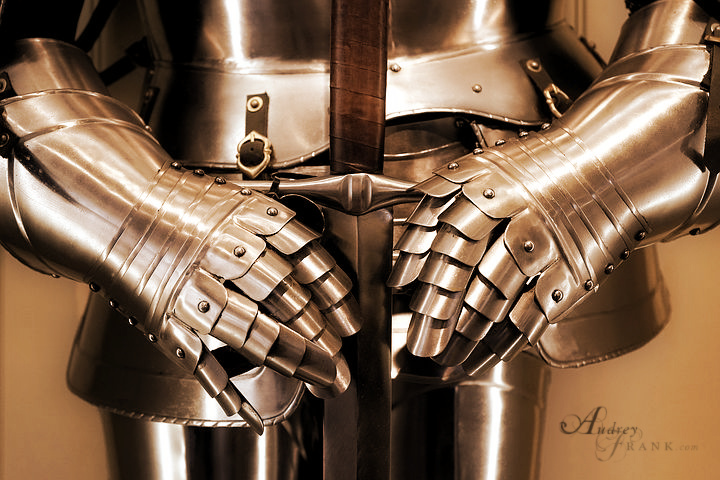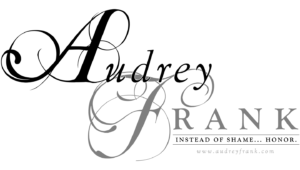Thoughts on Honor, Shame, and the Armor Others Put Upon Us

Recently on Twitter Brené Brown, shame researcher and storyteller, posted this thought:
“It’s not fear that gets in the way of showing up – it’s armor. It’s the behaviors we use to self-protect. We can be afraid and brave at the same time. Armor suffocates courage and cages our hearts. The goal is to create spaces where armor is neither necessary nor rewarded.” Brené Brown (Twitter)
https://twitter.com/BreneBrown/status/1093981324644401152
Her comment is insightful and started me thinking about armor. The behaviors with which we arm ourselves are certainly one kind of armor.
But what about the armor others put upon us?
We can take up our own armor, or others can put armor on us. Others can load us down with oversized, misfitting armor they feel we should wear for myriad reasons. Such armor can take the form of honor or shame.
We see a fascinating illustration of this in 1 Samuel 17, the famous story of David and Goliath. The armies of Israel were paralyzed with fear in the face of a belligerent, giant Philistine named Goliath. The massive man stepped forth morning after morning, raining down curses on Israel as they ran away terrified.
One day, while delivering food to his brothers in the camp, David overheard the bully once again defying the God of Israel. Incensed, David offered to go and fight him.
King Saul tried to reason with this mere boy who talked bravely and demanded to go up against the greatest enemy of Israel, but the boy could not be dissuaded. He wanted to face the giant without even so much as armor or a sword. When the king saw the boy was determined, he put his own armor on David and gave him his own sword.
I think Saul’s armor represented his honor. He had fought and won many battles in that thick armor. With those victories had come great respect. Saul was a mighty king who defeated his enemies in that armor, and he held himself in high esteem.
His sword represented his truth. Saul’s truth was that he had become full of himself, and turned away from the Lord. The great prophet Samuel had just broken the news to Saul that the Lord had rejected him as king. The truth about Saul was that his heart was set on himself. It follows that his honor was also focused on his own might, rather than the Lord’s.
David’s honor was not like Saul’s honor. David did not wear his honor externally. David bore an honor the great king could not see: David was a man after God’s own heart, and his honor lay in his communion with God.
Coming into the battlefield David was clear-minded and saw plainly the root of the problem, as illustrated in verse 26, “David asked the men standing near him, “What will be done for the man who kills this Philistine and removes this disgrace from Israel? Who is this uncircumcised Philistine that he should defy the armies of the living God?”
David understood that at the heart of the conflict was a struggle for honor. The shame of Israel must be avenged. How could that Philistine insult the God of Israel? Something must be done.
David’s honor was directly tied to the honor of the Lord, and David’s truth was that his heart was set on the Lord, not himself. David’s victory over Goliath would come through the name of the Lord Almighty, the God of the Armies of Israel, whom Goliath defied (v. 45). This was the truth which David wielded like a champion’s sword in the face of God’s enemy.
As David spoke with the warriors about the disgrace Goliath was bringing upon Israel, his oldest brother Eliab overheard him and burned with anger (v. 28). Rebuking him, he spewed forth words of shame and humiliation upon David. Eliab probably wished he had come up with David’s courageous idea. As firstborn, he was born into a family position of highest honor among his siblings. To have his youngest brother display wisdom and courage beyond his own was an insult. Shame was his weapon against his little brother, an attempt to “put him in his place”.
Eliab tried to force an armor of shame on David and Saul tried to force an armor of honor upon him. But David shrugged off both, running freely toward his enemy with confidence and strength. David knew that his honor and ability to face the enemy rested solely in the name of the Lord.
The temptation of Eliab’s armor of shame was to make David believe he was foolish, that he was not qualified to face the great enemy Goliath.
Shame accuses us that we are not qualified, we are not enough, we are foolish to think we can do anything that matters. It seeks to stop us from doing great things, asking, “Who do you think you are?”
The temptation of Saul’s armor of honor was to make David rely upon the greatness of man instead of the name of the Lord, which is the very trap Saul himself had fallen into just before the fateful face-off with Goliath (see 1 Samuel 15).
Human honor entices us to exalt ourselves above the Lord, and go forward clumsily at best in our own greatness. It seeks to turn us away from the Lord and focus on ourselves and our own glory.
Rather than stoop his shoulders under the burden of shame, David refused to get distracted from the battle by thinking of himself.
Rather than stumble forward awkwardly under the oversized and ill-fitting honor of man, David chose to run free with the tools he knew: the name of the Lord and a humble sling and stone.
Neither the armor of shame nor the armor of human honor was necessary that day in the Valley of Elah. Neither was rewarded. The battle the young shepherd boy fought was won by the honor of God alone, the strong name of the Lord Almighty whom Goliath defied. Israel’s disgrace was removed with the thunderous death crash of the giant, and honor was restored. All glory went to the Lord and still does as the story is recounted today.
When others seek to put on us either shame or honor, we can shrug it off, running forward with confidence in the freeing name of the Lord Most High. It is His honor we should want most to bear, and it is through His honor we are more than conquerors.
In David’s final words to the giant before he slays him, “All those gathered here will know that it is not by sword or spear that the Lord saves, for the battle is the Lord’s, and he will give all of you into our hands” (v. 47).
And that is exactly what happened.
Lord, help me resist the armor others try to put on me. Help me run forward with confidence in Your name to face my giant today. Amen.

No Comments